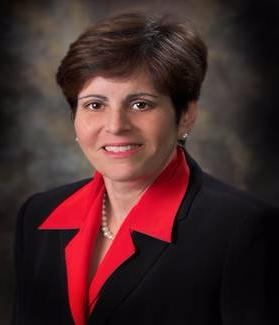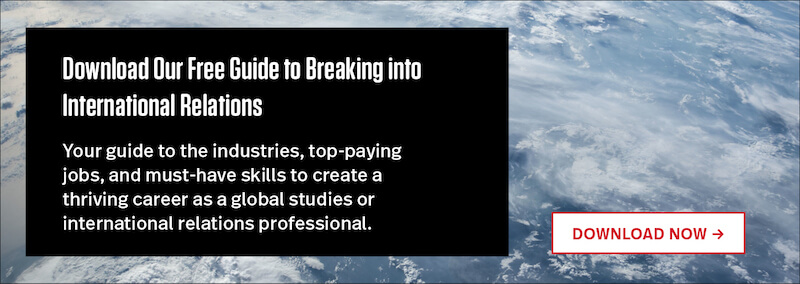 The students in Gail Marcus’s classes have taken field trips to Walmart, a Korean-owned coffee-shop chain, and to the Four Seasons Hotel Boston. The visits are designed to bring the global business scenarios that Marcus’s students study in class to life.
The students in Gail Marcus’s classes have taken field trips to Walmart, a Korean-owned coffee-shop chain, and to the Four Seasons Hotel Boston. The visits are designed to bring the global business scenarios that Marcus’s students study in class to life.
“It’s great to be grounded in theory, but how do you apply it?” she asks. “The world is getting smaller, and global knowledge is a requirement, not just an extra.”
A faculty member since 2013 in the Master of Science in Global Studies and International Relations program, Marcus teaches the “Global Consulting” and “Global Leadership” courses—both on the Boston campus and online.
Marcus embarked on her teaching career after 25 years in global leadership positions, including consulting. With two master’s degrees from the University of Pennsylvania, including one in computer science and another in business administration from the Wharton School of Business, she spent the first part of her career working for insurance companies in managed healthcare. After running a subsidiary of Cigna in London, she began consulting for England’s National Health Service.
Since then, Marcus has served as a CEO, CFO, and CIO, including running diagnostic laboratory corporations in Texas and Massachusetts. During the mid-2000s, after her personal experience with breast cancer, she chose to work for a major breast cancer charity, Susan G. Komen, as CFO. She serves on the advisory board for the federal Centers for Medicare & Medicaid Services, providing expertise in diagnostic lab testing.
Sharing Business Insights and Contacts
Now, Marcus is bringing her experience into the classroom. “If you’re a really good leader, you’re developing people and teaching them,” she says, adding that her many contacts in business enable her to invite numerous businesspeople and international consultants to speak to her students.
Those students have a variety of career goals related to policy, project management, international relations, and global studies. Marcus says the classes benefit from the perspectives of students from some of the countries the class discusses, including England, Thailand, Vietnam, and China.
The centerpiece of her courses is a series of case studies that bring students together in teams to tackle complex global business problems that raise a variety of cultural and economic issues.
In the “Global Consulting” class, for example, students designed a plan for a nongovernmental organization working to introduce honeybee farming to Kenyan communities. The students confronted issues such as building credibility with local leaders and addressing black-market competition.
Another group of students studied Walmart, comparing the attributes that led to its success in some places and hurt its prospects in others, and another compared the culture of Caffé Bene, a South Korean coffee shop expanding to Boston, with Starbucks.
During the summer of 2016, Marcus’s students visited the Four Seasons Hotel Boston while studying its plans to enter the Paris market. The company faced the challenge of exporting its pleasing-the-customer-at-all-costs model to a setting where the workforce culture differs from that of the United States. Marcus arranged for the hotel manager to give her students a tour and to talk about the hotel’s customer service culture.
In the “Global Leadership” class, students conduct role plays in front of the class—an exercise that Marcus says can be intimidating, but is essential to understanding situations in the eyes of someone from another culture and giving feedback cross-culturally.
“We talk about the importance of not assuming you’re right,” Marcus says.
In one role-play, students acted as the consultants brought in to help a hotel owner in a former Russian republic whose managerial staff were engaging in unethical practices. The classroom debate centered on whether to dismiss the unethical staff members or to coach them—or whether the owner should get out of the hotel business.
“There were students on all parts of the spectrum,” Marcus says. “When you have debates like that, it’s a great class.”
Marcus’s cases studies also address non-corporate global leadership, such as the band U2 and its lead singer, Bono, who have influenced global politics.
“Students may think global leaders are corporate, but a true global leader can be someone who is not running a business.”
Teaching Problem-Solving from Inside and Outside of Companies
Marcus insists on distributing students into a variety of workgroups in her classes, to simulate the real-world experience of working in consulting teams.
“It can be frustrating, because people aren’t exactly like you,” she says. “They can be smart and still have different views.”
Case studies complement the course curriculum, which includes traditional business fundamentals, such as SWOT (strengths, weaknesses, opportunities, and threats) analyses, and the 80/20 rule (which posits that 80 percent of business comes from 20 percent of customers, and 80 percent of productivity comes from 20 percent of time spent).
These cases, Marcus says, have interested some students in becoming consultants, so she discusses how to break into the field by working for a major consulting firm. Marcus emphasizes that people can be problem solvers from either inside or outside of a company. And sometimes, she tells her students, what companies think is the problem might not be the real issue.
Marcus, who lives in Lynnfield, Mass., and also teaches at the Massachusetts College of Pharmacy and Health Sciences, enjoys the curiosity of students at the College of Professional Studies as well as their diversity, in terms of geography, intellectual interests, and points in their careers. But for all her own workforce experience, Marcus is a student, herself, at the Medical University of South Carolina, in an executive doctorate program in health administration.
“As a student, I have a greater appreciation for the impact of teachers on students and how important it is to make a class relevant and interesting,” she says. “I remind myself of how it feels to be a student every time I enter the classroom.”






Related Articles
Why Earn a Professional Doctoral Degree?
5 Tips to Get the Most out of Grad School
Is Earning a Graduate Certificate Worth It?